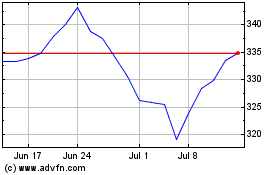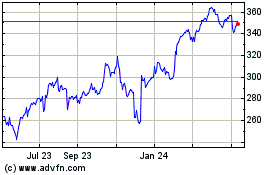By Joseph Walker and Anna Wilde Mathews
Insurers are scrambling to blunt the expense of new drugs that
can carry prices of more than $2 million per treatment, offering
new setups aimed at making the cost of gene therapies more
manageable for employers.
Cigna Corp. announced Thursday a new program that allows
employers and insurers to pay per-month fees for a service that
will cover the cost of gene therapies and manage their use. CVS
Health Corp. says it plans to offer a new layer of coverage
specifically for gene therapies, which would handle employers'
costs above a certain threshold. Anthem Inc. said it is looking at
special insurance setups to help employers protect themselves from
the financial impact of the drugs.
"You have all these new products coming to the market at these
very high prices," said Steve Miller, Cigna's chief clinical
officer. "Clearly this is a pain point in health care that needs to
be solved."
Cigna hasn't set a fee yet, but Dr. Miller said the company is
aiming for it to be less than $1 per member a month. Under the
program, patients would pay nothing out of pocket for the drugs,
Cigna said.
The protection plans are limited so far, and it isn't clear that
the insurers will be able to bring down the overall costs of the
therapies, as opposed to simply spreading them out. Insurers say
they are pushing for deals that tie payments for gene therapies and
other high-cost medicines to their results in patients.
Drugmakers, for their part, say they are open to working with
insurers on new payment arrangements that improve patient access to
their products.
Gene therapies, which replace a faulty gene with a functioning
copy, promise to cure hard-to-treat inherited diseases. But their
price tags threaten the balance sheets of employers and insurers,
especially as more hit the market.
Novartis AG priced Zolgensma, a gene therapy for a
muscle-wasting condition known as spinal muscular atrophy, at $2.1
million.
Meantime, Spark Therapeutics Inc. listed Luxturna, which treats
a form of inherited vision loss, at $850,000.
In June, Bluebird Bio Inc. said it would price a new gene
therapy for a rare blood disorder at EUR1.6 million ($1.8 million)
in Europe, where it has been approved.
"Employers are saying, 'I just can't afford it,'" said CVS
Health Chief Medical Officer Troy Brennan.
So far, health insurers have tried to balance providing patients
access to the new therapies with managing their cost partly by
setting conditions that limit who can get the drugs.
The protection plans represent an additional approach. The Cigna
program, called Embarc Benefit Protection, will launch with
Zolgensma and Luxturna for 2020, and the company aims to add more
drugs in the future, Dr. Miller said.
Embarc will administer the review process that decides which
patients can get the drugs, and Cigna's specialty pharmacy can
dispense the drugs.
Cigna said it wants to accumulate enough clients in the new
offering to gain more leverage with the drug companies and wring
out better deals for gene therapies. "We're looking for money-back
guarantees," said Dr. Miller.
A spokeswoman for AveXis, the Novartis subsidiary that developed
Zolgensma, said the company hasn't been briefed on the new
insurance payment plans, but recognizes "innovative therapies like
Zolgensma require innovative solutions for access."
A Spark spokesman said the company continues to evaluate "ways
to enhance patient access" to Luxturna with various
stakeholders.
CVS's new offering on gene therapies, for self-insured employers
that are clients of the company's Aetna health insurer, will
include Zolgensma and Luxturna and potentially other treatments,
Dr. Brennan said. The stop-loss program, which would cover an
employer's costs that exceed a set threshold, will be available for
2020. CVS is also working on a broader reinsurance product for
high-cost drugs, he said.
Anthem said it is evaluating reinsurance or stop-loss options
that employers could use to shield themselves from the high cost of
certain drugs.
The new options may prove attractive to employers that aren't
big enough to absorb the cost of the new drugs and don't have
existing stop-loss insurance that would cover them, said Nadina
Rosier, who is head of the pharmacy practice at advisory firm
Willis Towers Watson.
For companies that already have stop-loss policies that cover
such drugs, "You have to ask yourself, 'why am I double paying?'"
she said.
Insurers in Massachusetts have been working on a pilot program
in which they would forge installment-payment plans for expensive
one-time treatments like gene therapy and agree to continue making
payments even if patients taking the drug switch insurers.
The effort has stalled, however, because of drugmaker concerns
about Medicaid best-price rules, which require the government
program to receive the lowest price of any payer, said Mark
Trusheim, strategic director of the New Drug Development Paradigms,
a think tank run out of the Massachusetts Institute of
Technology.
AveXis is currently offering a payment option that allows
insurers to receive a rebate if the drug doesn't meet prespecified
clinical outcomes for the patient, the company spokeswoman said.
The rebate cannot exceed the statutory rebate of 17.1% that
drugmakers pay to Medicaid for pediatric drugs, the spokeswoman
said.
Write to Joseph Walker at joseph.walker@wsj.com and Anna Wilde
Mathews at anna.mathews@wsj.com
(END) Dow Jones Newswires
September 05, 2019 15:59 ET (19:59 GMT)
Copyright (c) 2019 Dow Jones & Company, Inc.
Cigna (NYSE:CI)
Historical Stock Chart
From Mar 2024 to Apr 2024

Cigna (NYSE:CI)
Historical Stock Chart
From Apr 2023 to Apr 2024
